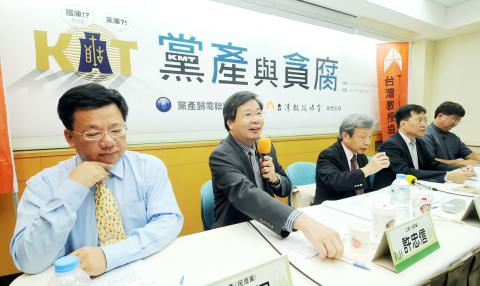The Chinese Nationalist Party (KMT) has so many ill-gotten assets that even it has no idea how much its assets are worth and the only certainty is that those assets are the root of all evil in Taiwanese politics because of the unfair competition that came with them, analysts said at a forum yesterday.
“In short, the KMT’s party assets are the root of all evil in Taiwan because of the unfair advantage they created. And despite the KMT having pledged to deal with the issue, the pledge was only an empty promise,” Democratic Progressive Party (DPP) Legislator Lee Chun-yi (李俊俋) said.
The forum, titled “Party assets and corruption,” was organized by the Taiwan Association of University Professors (TAUP) and gathered representatives from opposition parties and experts.

Photo: Lo Pei-der, Taipei Times
The KMT took over the assets of the Japanese colonial government and countless private businesses and individuals after it fled China and took control of Taiwan, a move many of its detractors have described as outright theft.
The party pledged in 2005 to sell all its assets, which had made it the richest political party in the world. It claims to this day that it placed most of its assets into a trust.
However, the gap between political parties’ financial support remains huge. While the DPP raised about NT$200 million (US$6.7 million) in donations with a month-long “piggy bank” campaign during the last presidential campaign, the KMT made NT$3.5 billion in 2010, including NT$2.9 billion from stock dividends, Lee said.
The KMT earned NT$2.14 billion last year, compared with the DPP’s NT$628 million, according to data released by the Ministry of the Interior.
Those assets have played an important role in the KMT’s dominance in elections at all levels, which is why it has been slow to deal with the issue, Lee said.
The KMT has blocked the legislative proceedings of a draft statute on the disposition of assets improperly obtained by political parties in the legislature more than 250 times and the political party act (政黨法) since 1993, Lee said.
“Not even the KMT knows how much it has in assets … Some say hundreds of billions, while some say trillions,” Taiwan Brain Trust researcher Chen Jin-ji (陳錦稷) said, adding that the party’s tactics to hide its assets have been carefully crafted over the years.
The calculation of the KMT’s total party assets would be extremely difficult and complicated, depending on whether some peripheral groups or organizations, such as the China Youth Corps and the National Women’s League of the Republic of China, are counted, Zero KMT Alliance executive director Lo Cheng-chung (羅承宗) said.
Others said that trying to resolve the ill-gotten assets issue in the legislature would be a waste of time because the KMT has a majority.
Taiwan Referendum Alliance convener Tsay Ting-kuei (蔡丁貴) said the best way would be a massive protest to force lawmakers to pass the political party act and force the KMT to speed up divesting its assets through a national referendum.
“Expecting the KMT’s goodwill on the issue would be a waste of time because the issue has been there for decades. It takes public pressure and action from the people to get things moving,” Tsai said.

“China is preparing to invade Taiwan,” Deputy Minister of Foreign Affairs Francois Wu (吳志中) said in an exclusive interview with British media channel Sky News for a special report titled, “Is Taiwan ready for a Chinese invasion?” the Ministry of Foreign Affairs said today in a statement. The 25-minute-long special report by Helen Ann-Smith released yesterday saw Sky News travel to Penghu, Taoyuan and Taipei to discuss the possibility of a Chinese invasion and how Taiwan is preparing for an attack. The film observed emergency response drills, interviewed baseball fans at the Taipei Dome on their views of US President

ECONOMIC BENEFITS: The imports from Belize would replace those from Honduras, whose shrimp exports have dropped 67 percent since cutting ties in 2023 Maintaining ties with Taiwan has economic benefits, Ministry of Foreign Affairs officials said yesterday, citing the approval of frozen whiteleg shrimp imports from Belize by the Food and Drug Administration (FDA) as an example. The FDA on Wednesday approved the tariff-free imports from Belize after the whiteleg shrimp passed the Systematic Inspection of Imported Food, which would continue to boost mutual trade, the ministry said. Taiwan’s annual consumption of whiteleg shrimps stands at 30,000 tonnes, far exceeding domestic production, the ministry said. Taiwan used to fill the gap by importing shrimps from Honduras, but purchases slumped after Tegucigalpa severed diplomatic ties with Taiwan

The Executive Yuan yesterday approved a southwestern extension of the Sanying MRT Line from New Taipei to Bade District (八德) in Taoyuan, with a goal of starting construction by late 2026. The 4.03-kilometer extension, featuring three new stations, will run from the current terminus at Yingtao Fude Station (LB12) in New Taipei City to Dannan Station (LB14), where it will connect with Taoyuan’s Green Line, New Taipei City Metro Corp said in a statement. This extension will follow the completion of core Sanying Line, a 14.29-kilometer medium-capacity system linking Tucheng (土城), Sansia (三峽)

CARGO LOSS: About 50 containers at the stern of the ‘Ever Lunar’ cargo ship went overboard, prompting the temporary closure of the port and disrupting operations Evergreen Marine Corp, Taiwan’s largest container shipper, yesterday said that all crew members aboard the Ever Lunar (長月) were safe after dozens of containers fell overboard off the coast of Peru the previous day. The incident occurred at 9:40am on Friday as the Ever Lunar was anchored and waiting to enter the Port of Callao when it suddenly experienced severe rolling, Evergreen said in a statement. The rolling, which caused the containers to fall, might have been caused by factors including a tsunami triggered by an earthquake in Russia, poor winter sea conditions in South America or a sudden influx of waves,